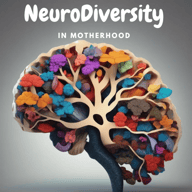The Importance of Self-Care for Maternal Mental Health and Emotional Well-Being


Understanding Neurodiversity and Its Impact on Motherhood
Mothers raising neurodiverse children often encounter specific hurdles, from the journey of diagnosis, acceptance of the child's condition, and understanding their child's unique needs to advocate for appropriate resources in health care and educational settings. These challenges can lead to significant levels of negative feelings such as stress, anxiety, sadness, feelings of isolation, fear and uncertainty about their child's future. Navigating these negative feelings can be overwhelming, especially when mothers are also dealing with societal misconceptions about neurodiversity. As mothers, we MUST understand that their mental and emotional well-being is as important as their child's.
The Importance of Self-Care for Maternal Mental Health
As mothers, we are "superwomen" already, BUT we must promote and or maintain your own mental health and emotional well-being by prioritise self-care and practise self-love, self-compassion, self-acceptance and gratitude; here are some strategies that can help us:
Connect with Supportive Communities: Engaging with other mothers who face similar challenges can provide invaluable emotional support. Online forums, local support groups, and social media communities dedicated to neurodiversity can help mothers feel less isolated.
Seek Professional Support: Professional help, such as individual or family therapy or counselling, can be immensely beneficial. A mental health professional can offer coping strategies tailored to a mother's unique situation and help her process the vast array of emotions that come with raising a neurodivergent child. Please read more about the therapy available at https://www.neurodiversityinmotherhood.com/the-5-most-effective-therapies-for-mothers-with-neurodivergent-children.
Be present in the moment with yourself. Here are a few tips: You can incorporate mindfulness practices into your routine, like meditation, yoga, or prayer. Incorporate simple techniques like deep breathing exercises, enjoying quiet moments, writing a gratitude journal, reading a good book, reading the Bible, or listening to music that makes you happy. Consistent wellness routines can significantly improve our mental and emotional well-being in the short and long term.
Set Boundaries: Mothers must recognise their limits and establish boundaries. This might mean declining additional responsibilities or asking for help at home. Prioritising essential tasks can free up time and energy for self-care. If you are a working mother, setting firm and fearless boundaries can be crucial to managing family and work-life balance.
Creating a Supportive Environment
Many mothers feel overwhelmed, leading to frustration and anxiety, however, focusing on the strengths and potential of neuroatypical children can foster a more positive mindset. Celebrating achievements, no matter how small, helps mothers shift their focus away from challenges and toward the joy of their child's individuality. By acknowledging the complexities of neurodiversity in motherhood with a more calm and positive mindset, as mothers, we can cultivate an environment that supports our children and ourselves. Open conversations about the challenges and triumphs of raising neurodiverse children can empower families. Sharing experiences with family members and friends fosters a better understanding of neurodiversity, breaking down stigma and isolation.
Conclusion
The mental health and emotional well-being of mothers raising a neurodivergent child is profoundly important, prioritising self-care and seeking support is essential for our motherhood journey. By nurturing our own emotional well-being and mental health, we not only benefit ourselves but also create a positive atmosphere for our neurodivergent children to thrive. Raising a neurodiverse child is a journey filled with challenges and rewards. When mothers recognise their needs, they can navigate this path with recognised resilience. You are not alone in this journey of motherhood and taking care of yourself first to raise happy and healthy kids.
